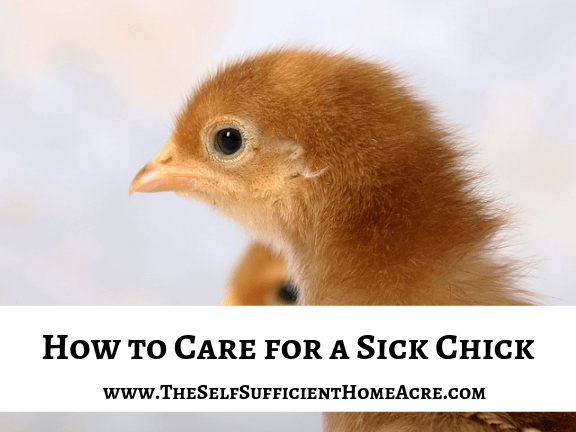
How to Care for a Sick Baby Chick
Knowing how to care for a sick chick could mean the difference between life and

This post contains affiliate links or advertisements. You won’t pay extra but I may earn a small commission if you purchase products through those links. Thank you for supporting The Self Sufficient HomeAcre!
For more information, check out my articles How to Hatch Chicken Eggs in an Incubator and How to Care for Day Old Chicks.
You might like to read my Sick or Injured Chick Infographic for the basics…
Prevention is the Best Medicine
Before you hatch eggs or order chicks online, make sure you have all the essentials ready for their arrival.
All baby poultry need proper food, clean water, and a warm brooder (95 F for the first week, reducing by 5 degrees F each week until fully feathered out) that is free of drafts.
Be sure there is room for the chicks to move away from the heat in case it is too warm.
Use a water dish that is shallow enough that the chicks can’t drown or get stuck in the water.
Incubating Eggs ~ Clean and disinfect your incubator before starting a hatch. Use eggs that are free of debris, feces, or broken egg residue that can harbor bacteria. Don’t wash the eggs. This will remove the protective coating, making them more susceptible to bacteria.
Keep the humidity and temps at the proper levels so chicks don’t have trouble hatching.
Dirty eggs or overly humid conditions during incubation and after hatch can cause ‘mushy chick’ disease. (Keep reading for more info.)

Ordering Hatchery Chicks
Make sure the hatchery is certified Pullorum free. Try to choose a hatchery that is close to home. If you can pick up chicks at the hatchery, that’s even better. If they must be shipped, upgrade to express shipping if you can. The less time they spend in shipping, the better.
Check all new hatchlings when they arrive to be sure they look healthy.
Dip their beaks in their drinking water when you put them in the brooder to teach them to drink. Don’t dunk too deeply, you don’t want to get water in their nostrils.
Check for signs of pasty butt. (Keep reading for more info.)
Baby birds that have been shipped should be given probiotics in their water to help them recover from the stress of the trip.
After a day or two, add electrolytes (or a small amount of sugar) to help give them a bit of energy. Do not give sugar water when chicks first arrive or it could lead to pasty butt.
As an Amazon Associate, I earn from qualifying purchases.
Feed to Prevent Chicks from Getting Sick
Use chick starter feed for most chicks and game bird starter or meat bird feed for broiler chicks, turkeys, and waterfowl.
The starter feeds are formulated for their growth requirements. Meat bird feed may also be fed to chicks, turkeys, and waterfowl that have higher protein requirements (check the label to see if it is formulated for feeding on day 1).
The Importance of Fresh Feed
Make sure the feed is fresh and there is no mold or rancid scent to it.
Vitamin E breaks down in storage after about one month (faster in warm conditions), so if the feed is old you may see symptoms of a deficiency in the youngsters.
Watch for problems with twisted necks affecting chicks or flopping over on their backs and waving legs in the air with ducklings.
Administer drops of vitamin E if this happens, get fresh feed, and add a vitamin and electrolyte tablet or powder with vitamin E to their water.
As an Amazon Associate, I earn a commission from qualifying purchases.
Clean Water to Prevent Chicks from Getting Sick
Use clean, fresh water that is not chlorinated and preferably hasn’t been treated with a water softener.
Several days after they arrive, you may add electrolytes to the chicks’ water to add vitamins, minerals, probiotics, and other nutrients.
After the first few days, you may give them plain water as long as they appear healthy. For a good start, I add powdered probiotics to their water from day one.

Brooder and Bedding
Clean the brooder out thoroughly and disinfect it before introducing the babies. Line the bottom of the brooder with a non-slip material that is easy to clean. Good options include:
- Paper towels
- Textured vinyl shelf liner
- Old rags or other non-slip fabric
You’ll need to clean or change the liner often so make sure it is affordable and sustainable. If you use paper towels you’ll go through a lot of them. Use the ones made from recycled paper and compost them to reduce the impact on our environment.
Don’t use anything that is slippery (such as newspaper), which can cause spraddle leg in young chicks. This is caused when their feet slip, causing difficulty standing and can lead to permanent damage to the legs.
As an Amazon Associate, I earn a commission from qualifying purchases.
Heat
Many people use heat lamps and it is possible to use them safely. However, I prefer not to use them in my house and I often keep the baby birds inside for a week or two before moving them to the barn. I have used the Brinsea EcoGlow brooders with very good results, but mine no longer function.
This winter I am using two seed starting mats and they are working perfectly. Check out my article on an inexpensive Redneck Brooder System if you are concerned about the safety of heat lamps.
You may also use a 100-watt incandescent bulb to heat a small number of chicks if the temps aren’t too low. Use a thermometer to make sure the temps are close to ideal.
As an Amazon Associate, I earn a commission from qualifying purchases.
Handling
Always handle baby poultry with extreme care. Gently cup them in both hands to prevent broken bones from dropping or squeezing too hard.
Children should be taught to handle chicks properly with adult supervision. Very young children don’t understand how badly they can hurt little birds.
Limit visits from friends and family and make sure they wash their hands before and after handling birds. You may need to decline visits from friends if they may bring bacteria or viruses from their own flock or wild birds.
As an Amazon Associate, I earn a commission from qualifying purchases.
Supplies
Just in case you have to deal with any problems once your baby birds arrive, it’s a great idea to have the following supplies on hand…
- Vitamins & electrolytes for chicks (in a pinch – 1 drop of molasses & 1 tsp sugar in
one quart of water) - Plain yogurt
- Medicine dropper (eye dropper)
- Small dish (can be a jar lid, thoroughly washed)
- Cotton swabs
- Antibiotic cream (without the pain relief meds added in)
- Stretch bandage (the disposable elastic, non-adhesive type)
- Antibiotics for oral administration (for a natural antibiotic use dried oregano)
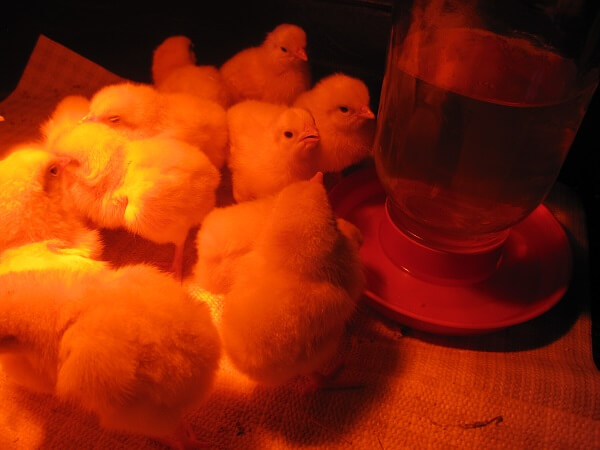
Treating Sick, Injured, or Weak Chicks
Sometimes you can’t prevent problems. When ordering chicks, there may be a few that don’t recover from the 2 or 3 days spent in shipping. Hatching your own certainly doesn’t eliminate all potential problems either. So what should you do for baby poultry that aren’t thriving?
Weakness
Chicks that seem weak should be cared for quickly. Warm the little one up in your hands and feed it plain yogurt mixed with water from an eyedropper.
Don’t force the liquid into their beak (unless it’s so weak it won’t take food at all), but rather drip very small amounts onto the end of the beak so the baby can tip its head back and swallow it.
Be sure it stays warm, isn’t being pecked by the others, and continues feeding at least every 2 hours until it is able to get food and water on its own.
If it begins to perk up, you can mix a pinch of chick starter feed into the yogurt mix and see if it will peck at the mix to eat.
If the little one had a difficult hatch or is just a bit weak from shipping, but is otherwise healthy, this should get it through a rough patch.
As an Amazon Associate, I earn a commission from qualifying purchases.
How to Treat Pasty Butt
Young poultry will sometimes have runny bowel movements that stick to their vent and fluffy little butts. If left unattended, this mess can paste over the vent entirely and prevent them from pooping.
This will kill a chick if the feces isn’t gently cleaned with warm water and a cloth or cotton swab. Be very careful not to tear their delicate skin while cleaning them.
Feed these babies some plain, unsweetened yogurt mixed with water as you would a weak chick, as described above. This will introduce beneficial bacteria to their digestive system and help eliminate the runny droppings.
Do not give any sugar, electrolytes, or anything with sugar in it as this can make pasty butt worse. Probiotics, water with real apple cider vinegar (with the mother), or plain yogurt are best.
As an Amazon Associate, I earn a commission from qualifying purchases.
Mushy Chick
This is a result of an infection starting in the yolk sac or the unhealed naval of the chick and is almost always fatal. You can attempt to administer antibiotics, but if the chicks do survive they are unlikely to thrive.
Prevent the problem in the first place with proper incubation methods. (Refer to the section on Incubating eggs, above.)
Symptoms include: the naval area looks infected, the abdomen is swollen and/or dark blue, a foul odor is coming from the navel, and the chick seems tired and doesn’t eat.
These little ones should be removed from the brooder immediately to prevent the spread of the disease. Put them in a separate brooder and disinfect any surface they may have touched.
Wash your hands thoroughly each time you handle them. Bacteria can
As an Amazon Associate, I earn a commission from qualifying purchases.
Coccidiosis
If you are concerned about coccidiosis, give your chicks a medicated feed or have them vaccinated at the hatchery. This disease is caused by parasites that are common in soil.
Symptoms include bloody diarrhea and a bloody vent.
It spreads quickly through feces so remove any sick chicks and disinfect the brooder immediately.
Give them feed containing a coccidiostat (unless they received a vaccine for coccidiosis) and keep water and brooder clean.
Keeping a healthy flock, rotating pasture, vaccinating or feeding medicated chick starter, and keeping chicks separate from adults will help prevent problems.
Young birds may develop resistance to local cocci populations. Some chicken keepers encourage good health for resistance, rather than using medications.
As an Amazon Associate, I earn a commission from qualifying purchases.
Vitamin & Mineral Deficiencies
There are too many possibilities to mention here. Most likely if you are feeding a fresh, balanced chick starter, the baby birds are getting all of the nutrients that they need.
If you aren’t sure, you may feed them a mashed boiled egg (remove the shell). If they have trouble eating this, mix it with enough water to make a thin gruel and feed it with an eyedropper by touching the food to the tip of their beak. Do not force feed or the chick may aspirate (fluid gets into the lungs and kills the chick).
Mixing a little bit of yogurt in with the egg will introduce beneficial bacteria to the gut and that may help too. For more information about deficiencies, check out this website…The Merck Veterinary Manual.
Preventing Injuries
Young poultry
If a chick is injured, remove it from the brooder to prevent picking from its hatch mates. Small cuts, scrapes, and pecks can be treated with an antibiotic cream (without numbing agents or pain relievers). Be sure that the injured chick is kept warm and has food and water available.
When it has healed, put it back in with the others. Watch to make sure that they don’t gang up on the ‘newbie.’ If they do, put up a small see-through barrier so they get used to each other again and then reintroduce. In instances where bones are broken or there are other internal injuries, home treatment is very difficult. Fashion small splints from cotton swabs and small strips of ace bandages.
If you do not have time to care for the chick and you don’t wish to seek veterinary attention, it might be best to put the chick down.
Putting a Chick Down
Sometimes it is necessary to euthanize a chick. If you wish to take it to a veterinarian who specializes in bird care, you have that option.
This article is not a complete reference for caring for sick or injured baby poultry. It is intended as a starting point. For more information about poultry diseases, check out this website…The Poultry Site ~ Diseases of Poultry.
As an Amazon Associate, I earn from qualifying purchases.
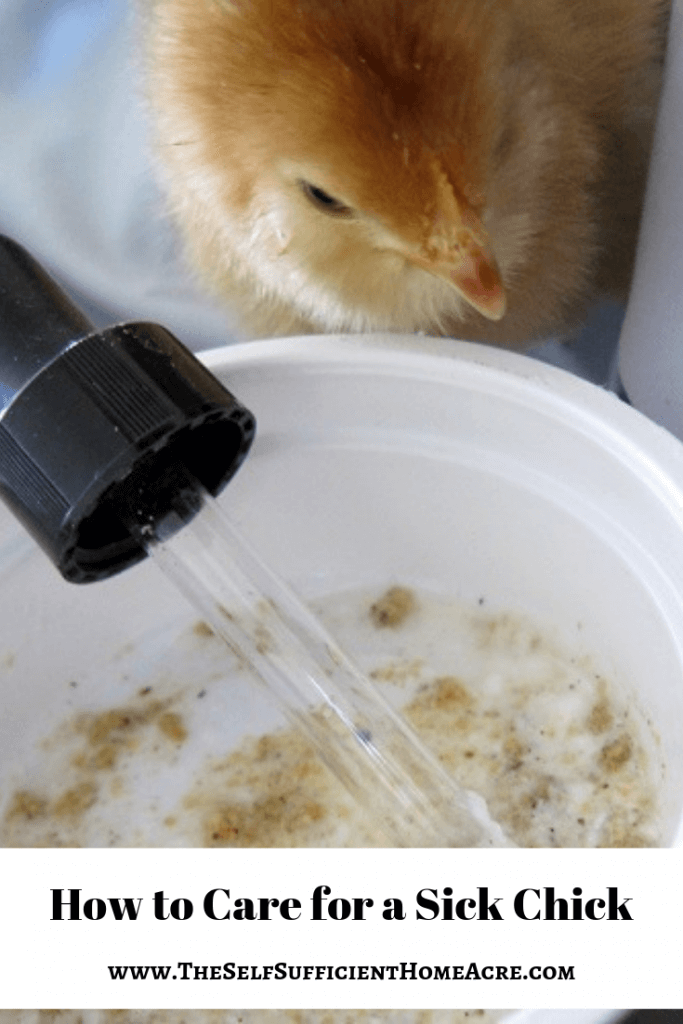

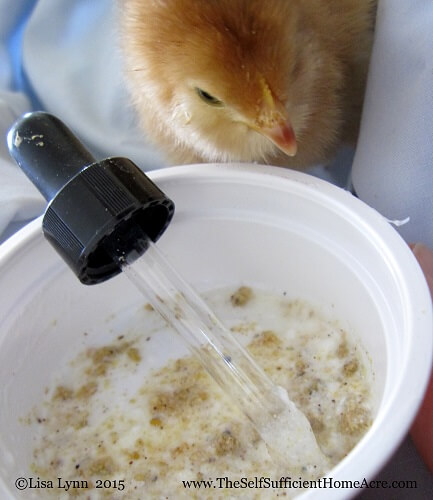
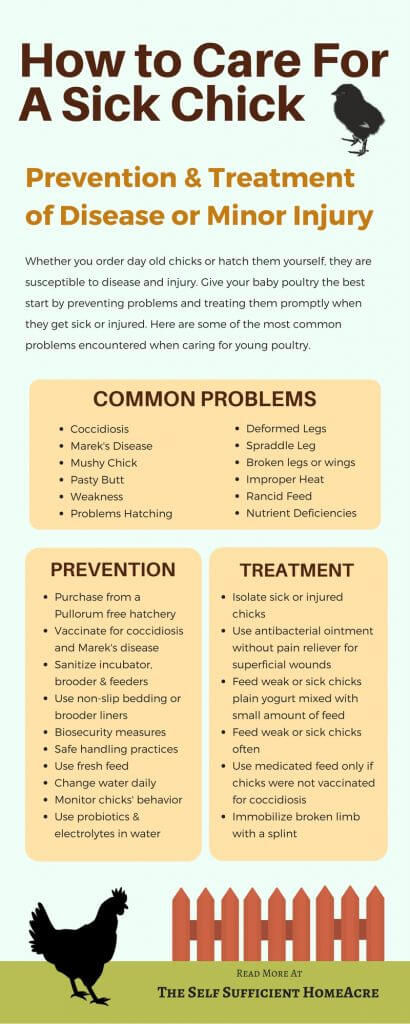


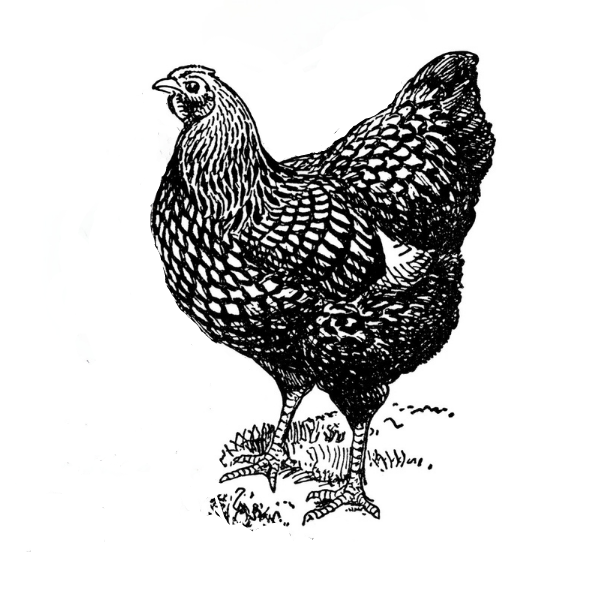

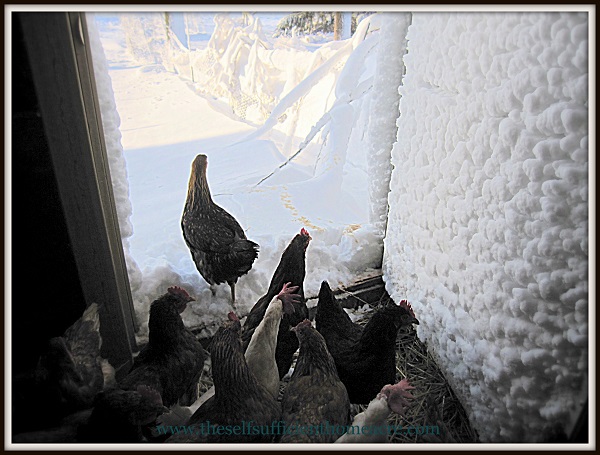

Hii my chick do not eat and poop and always sleep
I’m sorry to hear this. Did you dip the tip of the chick’s beak into water to teach it to drink? If they don’t start drinking and eating soon after arriving they become weak. Try to give a bit of water in an eye dropper by holding a drop to the chick’s beak to see if you can get it to drink. I hope this helps.
Hello I have a chick that only sleeps is very wobbly can’t walk well at all doesn’t eat or drink on its own (doest have splayed legs). But if I feed her with a syringe like just putting it on her beak she will eat and quite
Viciously (egg yoke from my other chickens) but still stays half asleep while eatting or drinking doses off then wakes up and eats more like a todler falling alseep in there highchair at the dinner table. I have vitamins added to the water but I am not sure if there is more I can do. It is like she doesn’t have any energy.
I’m sorry that your chick is doing poorly. It sounds like you are doing the right thing by feeding her by touching food to her beak… and egg yolk is a good idea since it has all of the nutrition that a baby chick needs for the first few days. If you have added electrolytes to the water, make sure that you change the water at least every 24 hours to prevent bacteria from growing in it. Also, you can add about 1 tablespoon of real apple cider vinegar (not white vinegar with color added to it) to 1 quart of water … this adds probiotics to help their digestive system. I use Bragg’s apple cider vinegar (also known as ACV) but any brand will work as long as it is raw and has live bacteria in it. Another way to add probiotics is to give the chick some plain, unsweetened yogurt or kefir… you can add a teaspoon to a tablespoon to their water or you can touch it to the beak. If the chick will eat this, try adding a bit of chick starter crumbles to some yogurt to soften and then feed a bit of that. I hope that this helps.
My son just found a baby chick in the backyard maybe days old. The chick’s eyes are closed, can not support it’s head and 1 leg seems to be broken. It chirps, but unable to stand up, head is down on ground. Maybe the chick is dying I am not sure, but would like to see if I can do something for this chick. Recommendations?
Hi Maira,
I’m sorry to hear about the chick and I hope this gets to you in time. I am assuming this is a baby chicken, not a wild baby bird. Baby birds need different food than chicks. The best thing you could do to help a baby chick in this situation would be to give it drops of water at the end of the beak to encourage it to drink. Do not force any liquid or food into its mouth but only hold the drops of water so that it just touches the tip of the beak. This should encourage it to drink. If it will drink small amounts of water, then try giving it some plain yogurt (no sugar or artificial sweeteners added) to give it some nutrients and probiotics. If the chick can eat the yogurt, continue giving small amounts of it every hour. Once the chick can eat the yogurt well, try giving very small amounts of moist food, such as bits of scrambled egg, cornmeal mixed with yogurt, or chick starter feed with water.
If the chick survives, you may be able to fashion a splint for the leg from cotton swabs (cut to the proper length) and elastic bandage wrap. This can be difficult because their legs are so small but do the best you can to keep the leg stable.
I hope this helps… Lisa
I have 6 week old chicks and last week I found one with back of neck all raw , no feathers, blood and so I separated her and brought her inside for about 4 days . I put her back out but in a crate well someone picked scab off but she is fine and today I saw ANOTHER chick with her neck all Raw !!! I did find roo inside the brooder area but idk if he would do that? I’m so worried it’s one of the other chicks and idk who? Every time I go nothing is happening
Hi Brandy,
A rooster will peck at chicks sometimes… do whatever you can to keep him out of the brooder. I have never seen chicks peck at each other to the point of drawing blood, so my guess is the rooster is the problem.
Hai …i had four chick all was fine at hatching after somedays one chicks acted lethargic and not eating well and the other four were grown well and the one is only half of the rest …please give me a tip ….i want my chick revive
Hi Nithees… I’m not sure what the problem is. Feed it some yogurt with a little bit of food mixed in to make sure it is getting nutrition and some probiotics. I hope your chick is okay.
She is also walking very straight legged.
The best advice I can give is to make sure your chick has clean water, plain yogurt, and is warm enough. You may need to offer drops of water with probiotics with an eyedropper to get her to drink. Do not force water in her beak, just touch the drop of water to the end of her beak. If they were shipped to you, they can get very weak and you’ll need to spend extra time to give her the best chance of survival. I hope this helps.
I have a week old chick who has just started hugging the walls and breathing deeply with her eyes closed. From what I can tell she is eating and drinking. She’s also really small compared to the rest of the chicks. She only relaxes when I’m holding her and she cuddles up in my hand with her eyes closed. I use this heat plate that is suspended a few inches above the floor of the brooder so the chicks can walk under it and warm up if they’re cold just like they would with a mamma hen. I don’t know if it’s to cold or to hot for her but I don’t think thats the problem because the other chicks love it. Have any suggestions? I don’t want her to die.
Hi Rosalie,
I’m so sorry you have a chick that isn’t doing well. Here are some suggestions… Try giving her a little bit of plain yogurt or some water with probiotics in it (you can try Sav-A-Chick if you have it). Keep her warm and, if possible, separate her from the other chicks in case she has something infectious. Check on her often and keep giving her little bits of yogurt if she will eat it.
I hope she gets better. Best wishes.
my chicks have born this day and this day itself one got sick and it has omitted what should be given to it
Hi,
Can you give me more information on what is wrong? Did you mean to say that the chick vomited? I hope it is doing better.
I took on a baby silkie it’s seems much smaller than the others at the store and it was a injury to it’s leg which is causing him issues standing to eat or drink so I have been syringe feeding .It doesn’t want the mushy food and a website for sick chicks said to feed egg yolk .I did that every few hours and the chick loved it I fed it until midnight but didn’t feed it through the night .This morning it’s not as eager to eat ( I figured I did a huge error by not feeding it through the night) also I noticed the little guy is spitting up mucous it’s kinda slimy .The website said it’s a crop issue and gave many ideas like baking soda in the water .
I can do what it needs I have syringe fed many things and bottle fed animals and have vet experience.
I’m keeping it warm away from drafts but I need assistance please .
What ca
Hi Janet,
I would make sure that you aren’t giving the chick anything with sugar in it because that can cause bacteria and yeast growth in the crop. Water with apple cider vinegar (1 quart water with 1 to 2 tablespoons acv is what I use these days)can sometimes help a chick with bacterial or yeast in the crop. Don’t force anything in its mouth but instead touch a drop of water (with acv) to the tip of its beak to encourage it to drink. If it can tolerate a small amount of plain yogurt mixed into the water for probiotics, try that.
I hope that this helps.
My baby chicken’s leg broke about a week ago.it was fine with broken leg but now from 2 days it is sleepy and lazy infact m feeling it will die soon please tell me what should i do to save him
Hi Sera,
It sounds like there may have been another injury besides the broken leg. It is also possible that there was internal bleeding.
The best advice I can give in this situation is to feed the chick plain yogurt with a sprinkle of chick feed on it, give it clean water with some electrolytes (fresh each day), and keep it separate from other chicks that might pick on it. Keep it warm…95 degrees Fahrenheit and comfortable. If you can create a splint for the leg to hold it in place to heal, without causing any additional stress, that would be the next step to take.
I hope this helps.
My chicks have feaces stuck on the behind and their legs appear dry like. What can i do
Hi,
This is called pasty butt and it can be very serious if it isn’t carefully cleaned off. Use a warm, wet cloth to soften and wipe away the feces. Be very careful not to tear their delicate skin. Give them some plain, unsweetened yogurt with a bit of food sprinkled on it. Make sure they aren’t getting any sugar or treats other than the yogurt and their chick starter feed.
Make sure they have plenty of clean water and add a tablespoon of apple cider vinegar to a quart of water, if possible.
Best wishes
Hi. I was looking for help with my baby chick. It’s 2 days old n it’s left leg goes completely out to its side n is really stiff n was using its wing to get around. I tried the band aid method n it didn’t work along with the straw n elastic. Last night I wrapped it in a face cloth in the position it’s leg should stay in. It seemed to help a little but not a lot. Do u have any suggestions
Hi Jamie,
It can be tough to treat a problem like this. I would suggest using a cotton swab as a splint and hold it firmly but gently in place with some adhesive tape wrapped around the leg. You may need to replace this if it gets dirty. This will give the chick a chance at using the leg. Make sure that the bedding or bottom of the brooder is not slippery or the chick will have trouble standing and using its leg. I hope this helps!
PS…my sister in law had a chicken that had this problem and lived to be several years old as a special needs bird in a very small flock.
Hello!
Just a mention that the antibiotic cream shouldn’t have the numbing stuff in it. The ones I have for my kids do, I had to go buy a separate antibacterial for our chick kit.
Thanks
Hi Emma!
Thank you for pointing that out. I thought I had that in this post! I’ve updated it now. Thanks again!
Taking care of chickens is hard work, but I love chickens that give me joy when raising chickens.
I have two chicks. They were fine a few days back but since last night one is not moving much. It was very active but not anymore. I took them in my garden for sunlight and a natural environment, soil, plants and all but don’t know why one is acting very lazy. There is no blood in its faeces its like loose motion. They are almost a month old please do suggest something. I have started Apple cider vinegar in there water
Hi Anam,
There are so many things that can happen, it is very hard to say. I would start by giving the chick some probiotics. You can do this with plain yogurt, chick grit with probiotics, or a probiotic made for chickens that is added to the water. Hopefully that will help it recover. Best wishes to the chick.
My chick ,most of the time, shouts a lot. It only keeps quite when it is in my hand and as i removes my hand it again starts shouting.
Also it keeps standing with its eyes closed.
when i bought it it was very active of all.
please help
Hi Ebad,
It sounds like your chick is either cold or sick. It needs a temperature of about 95 degrees Fahrenheit for the first week. You can also give it something soft to snuggle up in… such as a feather duster. I hope this helps.
I am a chicken breeder who needs awareness of diseases in chickens to prevent the disease from spreading. Chicken farming is my favorite job every day. Thank you for sharing your very useful information to the community.
Thank you, thuac ga da…much appreciated! Happy to have you here!
I am loosing baby chicks everyday . They get real weak and lay there and die can u please give me some advice on what to do!!! Thanks jessie
Hi Jessie,
I’m so sorry to hear that. I would need more information about what is happening to help much. Does it have diarrhea, bloody stools – that could be coccidiosis. Try reading through the article to see if I share the symptoms your chicks are having. I hope this helps.
Hi ,
I have 2 orphan kingfisher hatchlings bought 1 week before.may be now 14 days old .I want to know what I can feed them. I have give them sardines and river fishes .but now 1 is sick ,any medicine?
Did the sardines have salt? The salt could make them sick.
Are you grinding the fish up into a slurry? I would assume that you could take whatever fish the parents would eat, grind them up into a watery mush and feed them that.
Some baby birds also rely on the digestive enzymes of their parents for digesting their food. In this case, the babies may not survive.
I hope that this works out. I have no idea about medications for wild birds. Do you have any wildlife rehabilitation people in your area?
Hii! i recently bought some 3-day old chicks and now they have reached the age of nearly 3 weeks…..but one of them is very lazy and is not much active as the rest. he usually eats and drinks but most of the time, he will close his eyes while standing and chirping as if he has some disease or something. need help! any suggestions for feed etc.?
Hi Sam,
Does your chick seem to have any problems walking or flapping its wings? Did you have them vaccinated for Marek’s disease? Usually Marek’s doesn’t show up this early, but I suppose it could happen.
Are you noticing any bloody or unusual stools? Blood in the stool could be cocidiosis…a parasite infection and there is medicated feed for that…but only use it if the chick was not vaccinated for cocidiosis.
Those are two of the most common problems but there are other possible problems. I suggest putting electrolytes and probiotics in the water if you can. That will give the chick the best chance at surviving. If you don’t have store bought (Sav-a-chick is what I use) you can try giving it plain yogurt and put a little sugar and a drop of molasses in the water.
Hi my chick is feeling sick please tell me the name of the medicine or injections. Is the medicine and injection available in pharmacy only chicks medicine please tell me what can I do?????????? Please telle the name of medicine and injection name.
Hi Irfan,
I’m sorry I can’t be more specific about medications without knowing what is wrong with your chick. Please write back and tell me what the symptoms are…
– bloody diarrhea? Probably coccidiosis – isolate chick, sanitize brooder to prevent spread, give all chicks a coccidiostat or give medicated feed.
– blue, sticky ‘navel’ area? Mushy chick…apply neosporin to navel and give antibiotics (kind will depend on where you live and what is available)
– gasping for breath? May have ingested something, food or water may have gone into lungs…this is not something I can help you treat.
If you can give me more info, I will try to help.
Hi Lisa thanks for the great info. One of my lil chicks looks injured. I think is a wing and a leg. Is it possible for it to get healed with lits if care and attention? Its eating snd drinking well but can’t walk. What should I do?
Hi Molly,
Your chick might heal and be okay. It depends on what is causing the problem. If it has a broken wing and leg, I would try applying a splint. Here is a site that gives more info…
https://www.animalwised.com/healing-a-fractured-bird-leg-how-to-make-a-splint-667.html
It isn’t easy to heal a chick with a broken bones. It should be separated and let it eat as much food as it would like (unless it is a cornish cross meat bird).Best wishes…Lisa Lynn
How do I keep my injured chick warm during the night ?
Hi,
It is best if you can keep injured or sick chicks in a warm room in the house as they heal. I use a seed mat heater to keep chicks warm, but you can also use an incandescent light bulb over their cage. You can read more about keeping your chicks warm in this post…
https://www.theselfsufficienthomeacre.com/2014/03/how-to-care-for-day-old-chicks.html
Best of luck to your injured chick!
hey my chick has been looking really sick since yesterday, it’s barely moving and eating anything. i really don’t know what to do.
Hi Zack,
I’m sorry to hear that. Did you try the tips in the article? I would first try adding electrolytes to the drinking water, and mixing plain yogurt with water and feed it some with an eyedropper.
I hope this helps. There is a lot of info in the article…maybe one of the descriptions will give you a better idea of what is wrong?
My chicken hatched chicks it’s been about a week we moved them indoors due to crazy weather. We have these weird small hens that lay extra small eggs one of the chicks hatched from that small egg and is very weak it did not start this way it was normal until yesterday. It falls over and can’t get up kinda like a turtle on it’s back. Any suggestions????
Hi Brandie,
I’m sorry to hear about your chick. Try removing the chick and keeping it on it’s own to see if it gets better. Make sure it has clean water, and is eating and drinking. Electrolytes in the water would be advisable. Feed mashed egg yolk in its food. I hope this helps.
I have a week old chick that is very lethargic. Her chest seems “squishy” and she seems to be breathing deeply. This is my first batch of chicks and all the others are doing wonderful. I have her separated from the rest and am trying to get her to drink. Any ideas?
I have a young chick, she can’t walk quite right, but she eats and drinks but looks weak, what can I do for her??
Try putting some electrolytes or a little molasses (1 tsp per gallong) and some apple cider vinegar in her water (1 Tbs per gallon). Make sure her feed is fresh and high in protein. Mix some mashed boiled egg yolk in the feed or free choice. This might give her a boost in energy. Best wishes!
I have a secret to growing healthy chicks? Scrambled eggs! I use scrambled eggs as an addition to the chick starter nearly every day until they are month old. Then as an occasional treat there after. Makes for very healthy, very sturdy birds. Think about it … our Creator put everything needed to grow a whole bird inside that egg. Who am I to argue with that?
Hi Don,
Good info! I’ve used boiled eggs mashed up, but not scrambled. 🙂 I’m sure that it is great for the chicks! High in protein and every thing they need. Thanks for sharing!
So much good information here. We’ve had chickens for years and it seems everyone who keeps chickens will lose chicks now and then. I did not know yogurt would help, thanks for that tip !
Happy to share, Kathy! Thanks for reading! 🙂
Just a mention that the antibiotic cream shouldn’t have the numbing stuff in it. The ones I have for my kids do, I had to go buy a separate antibacterial for our chick kit.
Hi Anne,
I didn’t know that…do you know why? Thanks so much for the information!
I believe it’s bc anything that ends in ‘caine’ (which is the numbing ingredient in antibiotic cream), is toxic to birds ..not sure why tho
Thank you so much for letting me know, BJ! I will need to do some more research into that.
I wish I had read this last week. Bought eight 3day old chicks. And I have lost 3. Started making a concoction of their food in hot water with a drop of Apple cider vinegar. They are going crazy eating it and getting much bigger. I am praying I have lost my last one. It’s hard to loose them .. It’s my 1st year
I’m so sorry to hear about your little ones, Carrie 🙁 I’ve also lost young chicks and it’s hard. You did good with the warm water and a bit of acv…it also has probiotics (unless it is distilled). It sounds like the rest should do fine now. Good luck with them!
Thanks, that is a lot of good information. I am getting my first chickens soon, but not baby chicks. I have found a local source that will have chicks 4-5 months old. Can’t wait to start this adventure
That’s awesome, Terry! You’ll have them just a month or so before they start to lay 🙂 (For most breeds, that is) You will have a blast and you’ll find yourself arranging your furniture so that you can watch the chickens from the house and patio, lol! Enjoy the adventure!
Terry, can I ask where? I wish I could buy them a little older. It’s hard with 3 day old ones
Hi Carrie,
In another comment, Terry mentioned that she has friends or neighbors who raise chickens and she is getting hers from them. You could look on Craigslist, but be aware that there can be diseases that come along with them.